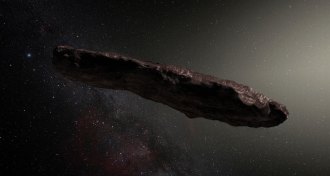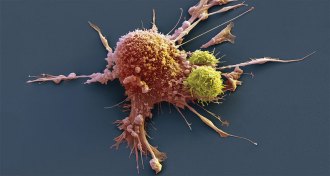All Stories
-
 Astronomy
Astronomy‘Oumuamua may be a comet, not an asteroid
The solar system’s first known interstellar visitor doesn’t appear to be the asteroid that scientists thought it was.
-
 Health & Medicine
Health & MedicineHow to make CAR-T cell therapies for cancer safer and more effective
CAR-T cell therapy was approved by the FDA in late 2017. Now, scientists are working to tame the cancer treatment’s side effects.
-
 Genetics
GeneticsReaders ponder geothermal power and more
Readers respond to stories from the May 26, 2018 issue of Science News.
-
 Health & Medicine
Health & MedicineMedical breakthroughs come with a human cost
Editor in Chief Nancy Shute muses on the risks many medical advances pose in their infancy.
By Nancy Shute -
 Health & Medicine
Health & MedicinePoliovirus treatment helped patients with deadly brain tumors live longer
A genetically modified poliovirus appears to help fight brain cancer, a small, early-stage clinical study suggests.
-
 Climate
ClimateWhy won’t this debate about an ancient cold snap die?
Critics are still unconvinced that a comet caused a mysterious cold snap 12,800 years ago.
-
 Life
LifeZika gets the most extreme close-up of any flavivirus
The closest look yet at Zika virus may reveal some vulnerabilities.
-
 Neuroscience
NeuroscienceWatch the brain jiggle with each heartbeat
A new twist on MRI can reveal how the brain wiggles.
-
 Health & Medicine
Health & Medicine‘Aroused’ recounts the fascinating history of hormones
The new book "Aroused" demystifies hormones, the chemicals that put the zing into life.
-
 Neuroscience
NeuroscienceHow domestication changed rabbits’ brains
The fear centers of the brain were altered as humans tamed rabbits.
-
 Earth
EarthThis volcano revealed its unique ‘voice’ after an eruption
Identifying patterns in a volcano’s low-frequency sounds could help monitor its activity.
-
 Science & Society
Science & SocietyFighting sexual harassment in science may mean changing science itself
Sexual harassment is disturbingly prevalent in academia. But a course correction may involve tearing down the hierarchy that makes science run.